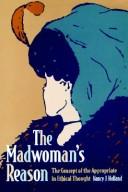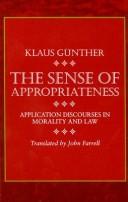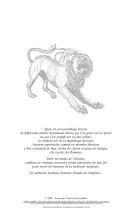| Listing 1 - 5 of 5 |
Sort by
|

ISBN: 0198239017 9780198239017 Year: 1996 Publisher: Oxford: Clarendon,
Abstract | Keywords | Export | Availability | Bookmark
 Loading...
Loading...Choose an application
- Reference Manager
- EndNote
- RefWorks (Direct export to RefWorks)
Appropriateness (Ethics) --- Justice --- --Appropriateness (Ethics) --- Justice. --- Appropriateness (Ethics). --- --Appropriateness (Ethics).

ISBN: 0271017716 Year: 1998 Publisher: University Park Pennsylvania State university press
Abstract | Keywords | Export | Availability | Bookmark
 Loading...
Loading...Choose an application
- Reference Manager
- EndNote
- RefWorks (Direct export to RefWorks)

ISBN: 0585092591 9780585092591 0791415511 079141552X 1438405235 Year: 1993
Abstract | Keywords | Export | Availability | Bookmark
 Loading...
Loading...Choose an application
- Reference Manager
- EndNote
- RefWorks (Direct export to RefWorks)
Günther's book demonstrates that most objections to moral and legal principles are directed not against the validity of principles but against the manner of their application. If one distinguishes between the justification of a principle and its appropriate application, then the claim that the application of the principle in each individual case follows automatically from its universal justification proves to be a misunderstanding. Günther develops this distinction with the help of Habermas's discourse theory of morality. He then employs it to extend Kohlberg's theory of moral development and to defend this against Gilligan's critique. In the third and fourth parts of the book, Günther shows--in debate with Hare, Dworkin, and others--how argumentation on the appropriate application of norms and principles in morality and law is possible.
Appropriateness (Ethics) --- Norm (Philosophy) --- Prudence. --- Law --- Philosophy. --- Conduct of life --- Discretion --- Tact --- Wisdom --- Philosophy --- Ethics --- Jurisprudence --- LAW
Book
ISBN: 9783110260540 3110260549 9786613402578 3110260557 1283402572 Year: 2011 Volume: 19 Publisher: Berlin ; New York Walter de Gruyter
Abstract | Keywords | Export | Availability | Bookmark
 Loading...
Loading...Choose an application
- Reference Manager
- EndNote
- RefWorks (Direct export to RefWorks)
Angemessenheit ist der Schlüssel zur Persuasion: Überzeugen kann eine Rede nur dann, wenn sie sich an den Meinungen der Zuhörer und den konkreten Umständen der Situation orientiert. Wie aber vermag die rhetorische Theorie - die, wie jede Theorie, abstrahieren muss -, das Phänomen der Angemessenheit zu fassen? Angemessenheit wird in der rhetorischen Tradition unter verschiedenen Rubra behandelt: vom kairós der Sophisten bis hin zur höfischen convenienza bei Castiglione. Besonders weitreichend sind ihre Implikationen für die Rhetorik des Aristoteles und für Ciceros Synthese von Rhetorik und praktischer Philosophie: als decorum orationis und decorum vitae. Dass dem bisher nie in einer Monographie analysierten Konzept der Angemessenheit in der Rhetorik stets eine zentrale Rolle zukommt, ist Hauptthese dieses Buches. Es untersucht detailliert und textnah die Konzepte von Angemessenheit und den "modus operandi" der verschiedenen Autoren - mit teils überraschenden Ergebnissen.
Rhetoric --- Appropriateness (Ethics) --- History. --- Philosophy. --- History --- Philosophy --- Ethics --- Sophists (Greek philosophy) --- Philosophy, Renaissance. --- Philosophy, Modern --- Renaissance philosophy --- Philosophy, Ancient --- Aristotle. --- Cicero. --- Rhetoric. --- Style.

ISBN: 2760521575 1435689399 9781435689398 9782760521575 9782760511446 2760511448 Year: 2001 Publisher: Sainte-Foy Presses de l'Université du Québec
Abstract | Keywords | Export | Availability | Bookmark
 Loading...
Loading...Choose an application
- Reference Manager
- EndNote
- RefWorks (Direct export to RefWorks)
Ce livre s'adresse principalement aux juristes, aux philosophes et aux bioéthiciens qui s'intéressent à la poussée expérimentale qui obsède les techniques médicales modernes. Il constitue une application de l'oeuvre du juriste Pierre Legendre sur la question des xénogreffes. Doublement ambitieux, l'ouvrage relie un commentaire du travail du plus important juriste francophone moderne et un problème tragique : celui de pallier par des organes de porc la pénurie d'organes humains à greffer.Cette approche inédite tend à faire apparaître le caractère idéologique de ce soin médical de pointe. Elle exige en outre du droit un ressaisissement quant à sa portée dogmatique plutôt que sa réduction à une technique secrétariale savante. Ce travail soulève, au-delà de l'évocation, la dangerosité virale pour la société non consentante à des contacts entre les espèces (la mutualisation du risque), la question des principes juridiques tenant le système du droit civil en état : la dignité de la personne humaine, son intégrité dans l'espèce. Une question de principe qui devrait marquer la limite à cette expérimentation médicale, même si celle-ci devait s'avérer techniquement praticable ou virologiquement neutre. Finalement, cet ouvrage adresse pour la première fois au grand public les questions éthiques véritables relatives à cette technique médicale.
Appropriateness (Ethics) --- Acceptabilité (Morale) --- Body, Human --- Human experimentation in medicine --- Medical technology --- Xenografts. --- Corps humain --- Expérimentation humaine en médecine --- Technologie médicale --- Hétérogreffes. --- Law and legislation. --- Droit. --- Legendre, Pierre, --- Heterografts --- Heterologous transplants --- Heteroplastic grafts --- Xenotransplantation --- Bioethics. --- Transplantation of organs, tissues, etc. --- Medical laws and legislation --- Biology --- Biomedical ethics --- Life sciences --- Life sciences ethics --- Science --- Moral and ethical aspects --- Human beings --- Body image --- Human anatomy --- Human physiology --- Mind and body --- Ethics --- Bioethics --- Transplantation of organs, tissues, etc --- xenotransplantatie --- 17.023.33 --- 172.022.11 --- 342.721 --- 614.253 --- Filosofie der geneeskunde --- Gezondheidsrecht --- Medische ethiek --- Orgaantransplantatie --- 614.253 Relations of doctors with colleagues, with patients. Medical ethics --- Relations of doctors with colleagues, with patients. Medical ethics --- 342.721 Persoonlijke vrijheid. Privacy. Wetgeving i.v.m. transplantatie van organen --- Persoonlijke vrijheid. Privacy. Wetgeving i.v.m. transplantatie van organen --- 172.022.11 Sociaal-ethische waarden. Waarden van de sociale ethiek --- Sociaal-ethische waarden. Waarden van de sociale ethiek --- 17.023.33 Biologische doeleinden. Bio-ethiek; bioethiek. Übermensch. Medische deontologie --- Biologische doeleinden. Bio-ethiek; bioethiek. Übermensch. Medische deontologie --- Law and legislation --- xénotransplantation (xénogreffe) --- Philosophie de la médecine --- Droit sanitaire --- Ethique médicale --- Transplantation d'organes
| Listing 1 - 5 of 5 |
Sort by
|

 Search
Search Feedback
Feedback About UniCat
About UniCat  Help
Help News
News